In a world where hard-hitting news and cat videos hang out in the same place- a world where everyone with access to a WiFi connection is a journalist- is journalism in trouble?

The millions of available blogs online can make any literate human question the true meaning of journalism. The debate doesn’t stop at blogs, though. Many of the news stories covered by media outlets have shifted exponentially in recent years. With the changing ways of the world, and immediate updates at our fingertips, the definition of journalism is more unclear than ever.
Why is this? Why has an expanding world of technology, which should be a positive thing, brought into question the legitimacy of present-day journalism?
Let’s take a look.
Job Loss
According to a blog post by Jordan Chariton, media reporter for The Wrap, staff writers at the New York Daily News took a huge hit last year. The reporter noted that the “click-hungry digital operation” controlling the field of journalism has contributed to an “ever-shrinking newsroom.”
The number of daily newspaper publications has plummeted in recent years, according to research from Stanley J. Baron’s Introduction to Mass Communication, a textbook used for Mass Media courses. In the year 1990, there were more than 1,600 daily newspapers in circulation. By 2014, that number had decreased to around 1,400.
If things continue at this speed, what is the future of journalism? Will broadcast news and online media be the only thing left?
As a journalist for a local paper, this topic hits close to home. Though our editorial meetings seem to indicate that our paper is doing just fine, I can see the subtle shift to social media. Since all of our content isn’t readily-available online, our readers have to buy the paper to get the scoop. However, with competing papers who give away content- even though it’s of lesser quality- we may have some changes coming our way. Will I have a job in two years, or will my publisher be forced to cut out the middle man because no one is buying our content?
With the loss of news jobs for qualified journalists, things are piled on those who are left behind. With the loss of publications altogether, in the information-hungry world we live, the Internet has become the new media for daily news updates. The difference? Quality.
Just for the clicks…
In a recent Twitter rant by Gareth Davies, former Trinity Mirror reporter, accusations were made that the demand for clicks has had a negative impact on the morale of the newsroom. Allegedly, the publication in question has been more interested in clicks and less interested in being accountable for vital news.
Davies asserts that the “death of local papers” needs to be combated, instead of accepted.
This “death” has been noted in publications around the world. The New York Times recently reported that the Sydney Morning Herald, a historic staple in Australian news, is looking at a grim future. With readership down, the once prominent platform isn’t seeing the financial growth it needs to push through.
As the world of journalism turns to the Internet, many stories are often lacking the quality and research that once meant something. Headlines are given to viral sensation wrap-up stories, while the true meaning of news is somewhere on page 3B.
Though it’s unclear how the world will run in the future, it’s obvious that journalism has a winding road ahead.
What does this mean?
John Oliver, comedian and host of HBO’s Lost Week Tonight, tackled the topic of journalism in a recent clip that has since received more than 6 million views.
Oliver points out the fact that print journalism is often cited in broadcast journalism. As the world changes, journalism is obviously going to follow suit. If new journalism platforms (Internet and broadcast media) are turning to the trusty platforms (newspapers) for information, newspapers must be careful to maintain the integrity and intensity that has always been expected of them.
For this very reason, in the clip above, Oliver goes on to say, “The media is a food chain which would fall apart without local newspapers.”
If local papers are this important, perhaps it’s time to take a look at the public, instead of the press. Instead of schools cutting the opportunity for interested journalism majors, and publicly maintaining the notion that print news is becoming invalid, it’s time to show that print journalism is becoming invaluable.
It seems counter-productive to use a blog post in an effort to combat the decline of print media and the importance of informed journalists, but what better place to be heard? What better place to tell you that you will benefit from purchasing a local newspaper. After all… now that it’s on the Internet, it must be true.
If you liked this post, check out Five Headlines From The Future, where we take a look at the future of journalism in an Internet-driven world.


